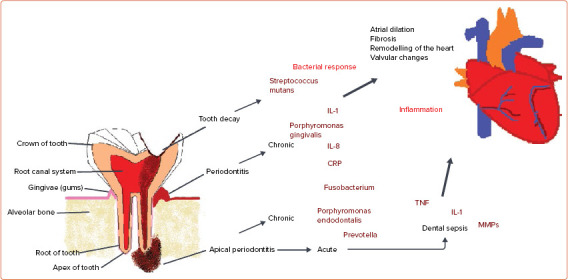{"title":"Atrial Fibrillation and Oral Health.","authors":"Amaar Hassan, Gregory Yh Lip, Laurent Fauchier, Rebecca V Harris","doi":"10.15420/aer.2021.09","DOIUrl":null,"url":null,"abstract":"© RADCLIFFE CARDIOLOGY 2021 Access at: www.AERjournal.com AF is becoming increasingly common and confers a major healthcare burden.1 The exact pathophysiological causes of AF have attracted much interest, but inflammation is thought to be an essential underlying aetiological mechanism implicated in the development of AF.2,3 Raised levels of biomarkers, such as C-reactive protein (CRP), interleukin (IL-1 and IL-6) and tumour necrosis factor (TNF), can lead to valvular changes resulting in atrial dilation and deposition of signalling molecules, such as matrix metalloproteinases (MMPs), leading to fibrosis of the atria.2 Identified risk factors for incident AF include smoking and alcohol intake, hypertension, obesity, diabetes and renal failure, along with acute conditions such as severe sepsis.2,4,5 One possible sepsis-related link with a risk factor that has hitherto received little attention is that of poor oral heath.","PeriodicalId":8412,"journal":{"name":"Arrhythmia & Electrophysiology Review","volume":"10 1","pages":"7-9"},"PeriodicalIF":3.3000,"publicationDate":"2021-04-01","publicationTypes":"Journal Article","fieldsOfStudy":null,"isOpenAccess":false,"openAccessPdf":"https://ftp.ncbi.nlm.nih.gov/pub/pmc/oa_pdf/52/20/aer-10-07.PMC8076966.pdf","citationCount":"0","resultStr":null,"platform":"Semanticscholar","paperid":null,"PeriodicalName":"Arrhythmia & Electrophysiology Review","FirstCategoryId":"1085","ListUrlMain":"https://doi.org/10.15420/aer.2021.09","RegionNum":0,"RegionCategory":null,"ArticlePicture":[],"TitleCN":null,"AbstractTextCN":null,"PMCID":null,"EPubDate":"","PubModel":"","JCR":"Q2","JCRName":"CARDIAC & CARDIOVASCULAR SYSTEMS","Score":null,"Total":0}
引用次数: 0
Abstract
© RADCLIFFE CARDIOLOGY 2021 Access at: www.AERjournal.com AF is becoming increasingly common and confers a major healthcare burden.1 The exact pathophysiological causes of AF have attracted much interest, but inflammation is thought to be an essential underlying aetiological mechanism implicated in the development of AF.2,3 Raised levels of biomarkers, such as C-reactive protein (CRP), interleukin (IL-1 and IL-6) and tumour necrosis factor (TNF), can lead to valvular changes resulting in atrial dilation and deposition of signalling molecules, such as matrix metalloproteinases (MMPs), leading to fibrosis of the atria.2 Identified risk factors for incident AF include smoking and alcohol intake, hypertension, obesity, diabetes and renal failure, along with acute conditions such as severe sepsis.2,4,5 One possible sepsis-related link with a risk factor that has hitherto received little attention is that of poor oral heath.




